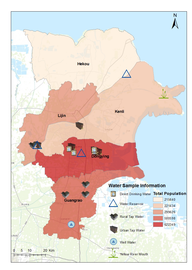How to fill the empty glass? Residential fresh water use in China
April 24, 2014.
China’s residential fresh water use has risen by 37% in the past decade (2000-2011). Therewith, it represents the fastest increase among all water uses in the country. The rapid increase in residential and other fresh water uses has led to an overexploitation of water resources and threatens sustainable fresh water supply in China. In 2013, two thirds of Chinese cities lacked fresh water resources and 22% had serious water shortages. In contrast, 14% of rural households were still without access to safe drinking water in the same year. In this context, the issue of how water policy and research can contribute to an inclusive and sustainable fresh water supply is at the top of ZEF’s research agenda.
Background
ZEF is dealing with this conundrum in a research project entitled “Delta Information System for Geo-environmental and Human Habitat Transition” (DELIGHT), which started in April 2013. The research aims to understand fresh water use by households in the context of urbanization in China, taking an integrated perspective of economics, social science and geography. A systematic approach will be adopted to analyze (1) the determinants of residential fresh water use in China; (2) characteristics and patterns of household behaviors with respect to water use; (3) whether knowledge and communication can motivate urban households to conserve water. So far, ZEF researchers have examined the first issue and the other two will be explored by conducting a large-scale survey in Dongying, China.
Preliminary results and recommendations
Based on a cross-disciplinary analysis, ZEF researchers have so far found rising household incomes, an aging society as well as urbanization to be the main drivers for the rapid increase in residential fresh water demand in China. A 1% increase of urbanization rate gives rise to an increase in fresh water consumption per capita of 0.97% if we assume all the other factors do not change. Accordingly, if the average urbanization rate reaches 60%, average residential fresh water consumption will increase to 198 liters per capita per day, which is more than 60% of water consumption levels in European countries (120-130 liters per capita per day). This result implies that it is high time for the Chinese government to incorporate water conservation policies into eco-city and sustainable development policies. China should adopt a policy that induces a more efficient use of domestic water and encourages individuals to conserve water.
Further activities
The project is collaborating with the German Aerospace Center (DLR) and the Chinese Academy of Sciences (CAS). The next step for ZEF’s researchers will be to organize a large-scale survey in Dongying to investigate the behavior of urban households in terms of water use. Also, the researchers will study whether/how water conservation knowledge and communication affect attitudes and behaviors towards water conservation among urban households.
Author:<link mail window for sending> Lili Jia
You can also read the article in ZEF news no. 29<link fileadmin webfiles downloads news zef_news_29_2014 zef_news_29_englisch_jia.pdf download file> here.



